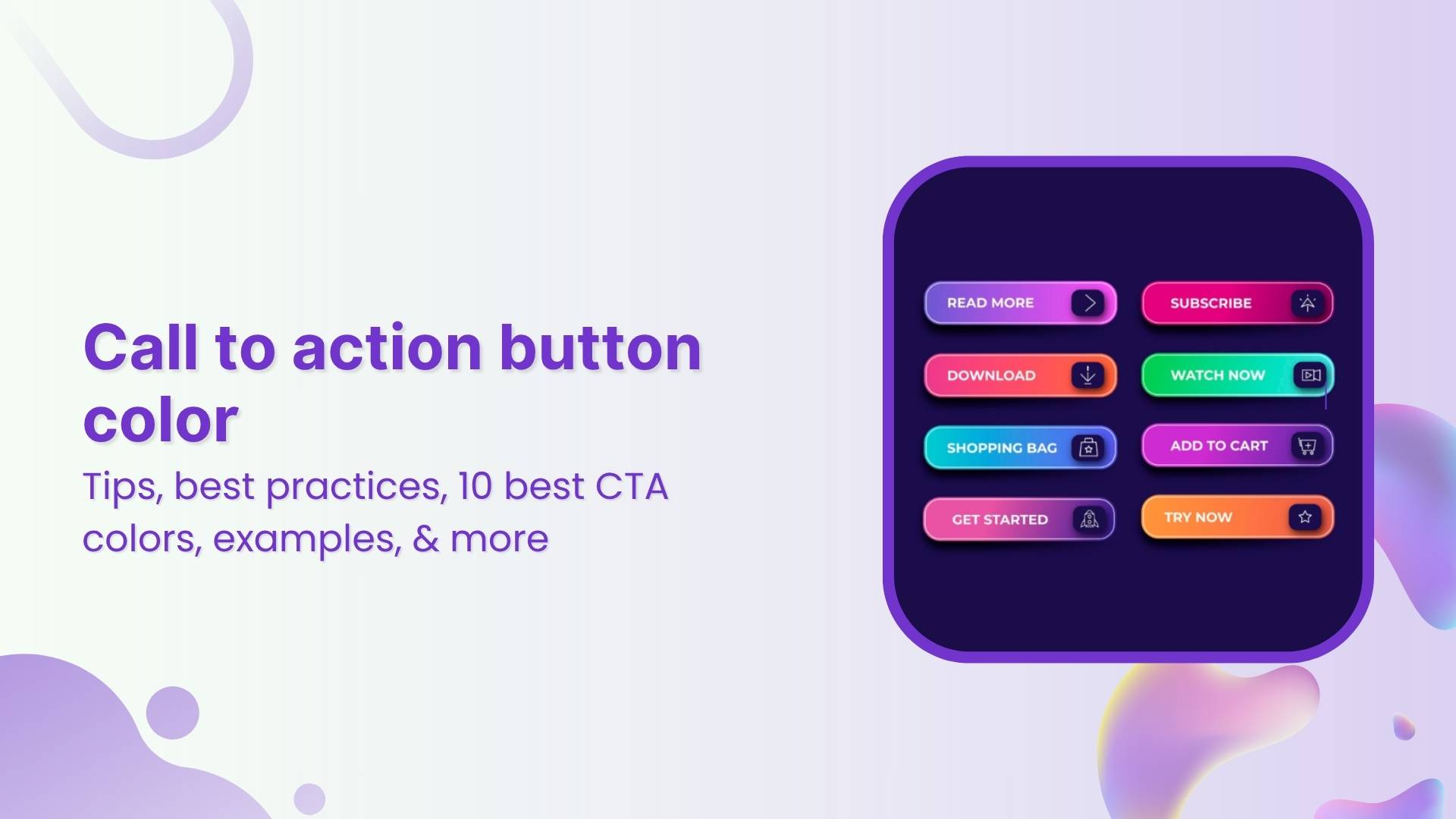Have you ever found getting website traffic challenges? Most bloggers struggle to get traction on their newly-built blogs. The lack of the flux of traffic means their blog content is not being discovered yet. I’d like to emphasize the content discovery of the right topics, especially how it leads to driving more website traffic.
What do most bloggers and digital marketers do when they want to drive website traffic?
They hunt for the right keywords to target through their content.
There is nothing wrong with going after the hot keywords, but when we chase the keywords, we sub-consciously build a narrative that keywords are more important than topics. So we neglect to discover the right topics, and instead, we try to find the right keywords.
What Does the Discovery of the Right Topics Mean?
The concept of discovering the right topics means skimming through the pool of ideas and coming up with a handful of topics that your audience would care about.
It may sound like a simple idea that one digs deeper into certain topics and chooses the right ones. How would they know that those topics are the most suitable topics to talk about? Is there any evidence to back up the recommendation?
Most bloggers and marketers utilize keywords research tools that help them tap on the keywords that people are using in search engines. A lot of bloggers try out such tools and create content around those keywords, but a fraction of bloggers succeed anyway. The reason is that they pursue the trend without understanding the idea.
Other the other hand, if you brainstorm the idea before going all in, you’d be able to understand:
- Does the topic interest you to talk about it?
- Could you pursue this topic in the long run?
- Would you be able to make a difference in others’ lives?
- Could you monetize the traction if things work out real good?
The point I’m trying to make is that there is a difference between the “right topic” and “hot topic.”
You may be able to attract eyeballs through hot topics, but what happens next?
This is why it’s essential to have a set formula to follow through to discover the right topics to cover on the blog.
Key Elements to Discover the Right Topics:
Relevance with your industry is a fundamental requirement. Otherwise, you’d end up focusing on the areas that don’t even matter.
Dominance in the niche is necessary to influence the audience and step ahead of the competition. To build relationships, solve problems, and pump out a great deal of content to dominate the niche.
The methodology is an important pillar for winning at this because it depends on your strategy how early you start to succeed and how far you go with your plan.
Authority is brand positioning you achieve when opting for the right target audience and deliver value to them, which starts to impact their lives.
How to Discover the Right Topics
Let’s dive deep into this and find out how you can discover the right topics by utilizing different attention avenues on the web:
Identify Your Engaging Social Media Posts
Social media engagement is one of the goldmines for website traffic, followers, and attention. Unfortunately, a vast majority of people don’t get this. They would rather focus on sharing their content links on Facebook and Twitter than writing a helpful status.
To make the most of this strategy, you have to dig into your social media posts and find out the top-performing social media posts. It’ll help you figure out what your audience has liked in the past as well as the type of audience you have gathered on social media channels. Therefore, you could make informed decisions about creating a content strategy and starting social media discussions.
Twitter Analytics
Go to your Twitter Analytics and look at the top tweets and most engaging tweets in the recent past.
Let me share my Twitter Analytics with you:

You can see the top tweet got 1,000+ impressions, and a mention from a fellow blogger got 17 engagement. Therefore, the total tweet impressions for April 2021 were 11.6k, which is quite good.
You can further dig deeper into Analytics and find out more details about your account.
The purpose is to find out what followers are liking on Twitter, and what kind of content is bringing in more followers.
Facebook Insights
The same goes for Facebook. What you need to do is go to your Facebook Insights section of the page, and look at the reach and engagements on your previous posts:
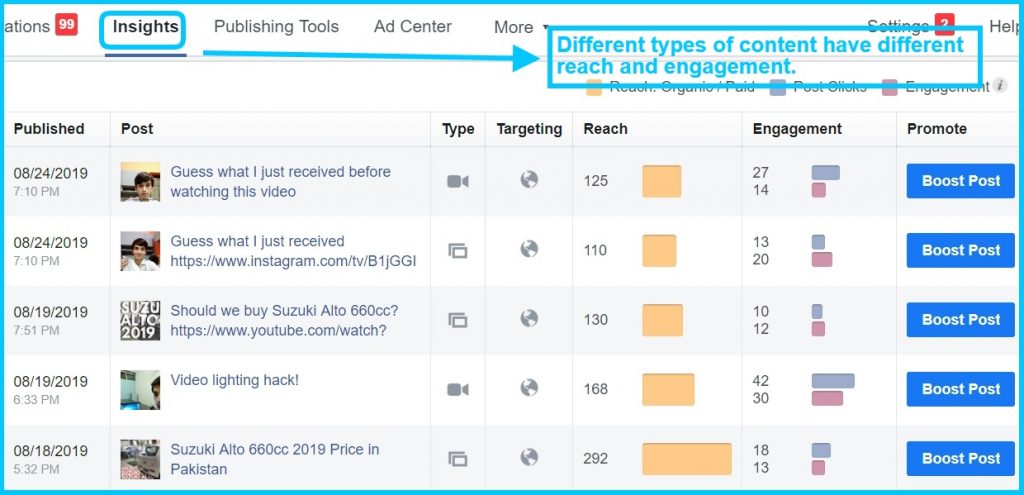
You can analyze what type of content is doing well. Mostly, videos beat every other content type, but you always have to test things out. Try out articles, images, and podcasts as well.
Targeting is a metric that tells you the audience you can choose to share your content with. You can share your content publicly or with a specific audience of your page, for example, the only people from your country.
Reach metric tells you how many people have seen your post, whereas, engagement showcases how many of them responded to your post via liking or commenting or sharing.
Pinterest Analytics
Pinterest is one of the popular social media platforms for sharing infographics and long-form images.
The Pinterest Analytics section also helps users analyze how their pins are doing on the platform.
Go through your Pinterest Analytics data and spot the top-performing pins on your account.
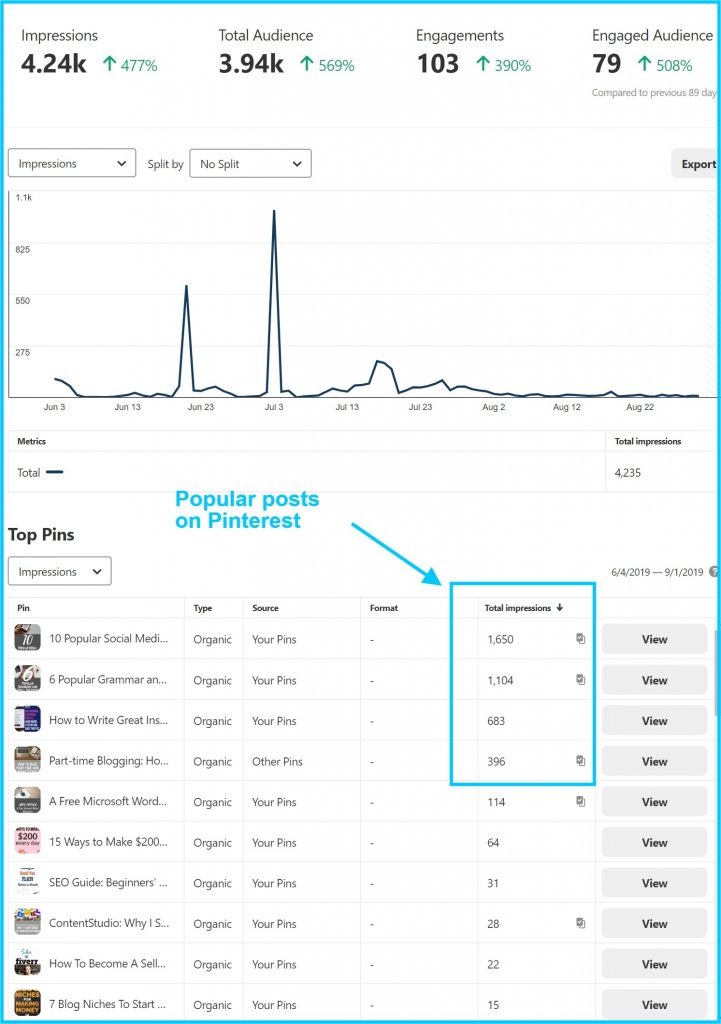
Once you know what kind of pins are outperforming others, you can create relevant pins and make the most of the momentum some of your pins are building.
So almost every top social media platform has an Analytics section to look at.
All you have to do is keep an eye on the social media analytics to find out your most popular content on the social media platforms to double down on those areas.
Find Out Your Popular Content Through Analytics
The job to find the right topics for increasing website traffic is a multi-dimensional task. You would have to try out several strategies to figure out what’s the best topic to choose from. One of those strategies is going through old content and finding popular posts to create similar content.
A lot of pro-bloggers know this strategy of tripling down on the content topic that has gotten some traction among all content.
Pat Flynn from Smart Passive Income said in a podcast episode that he wants to write articles related to “affiliate marketing” in bulk form and dominate this search term in Google. He went on to share that his site used to rank for affiliate marketing related term when he had fewer article on the topic, but now his site doesn’t rank for those terms.
Knowing your popular content isn’t just necessary for the sake of Analytics, but it’s also necessary to create future content that brings more eyeballs.
You might wonder how you can find popular content through website analytics and data.
There are different parameters to figure out what posts have been popular on your blog. Let’s discuss the most important ones:
Ranked Keywords
If you have not been playing around with any keyword research tool for analyzing your ranked keywords, then you should, at least, sign up for a Google Webmasters account. Once you set up your Google Webmasters account, it’d take a week or so to get started with collecting data of your website organic traffic.
You may want to know what keywords your site is being ranked for so that you could emphasize more on those keywords and include LSI keywords as well.
Social Media Shares
The number of social media shares tells you the popularity of your content on social media. If you aren’t using any social media sharing plugin on your blog, then you’re making a huge mistake. Not only you’re stopping people from sharing your account, but you’re also wasting the chance to get those social media numbers. Try Addthis, Sharethis, or Sumo for getting social media sharing buttons.
Moreover, a social media management tool such as ContentStudio must also tell you about the popularity of your content on social media.
It tells you how your social media posts are doing once they have been shared through this social media management tool.
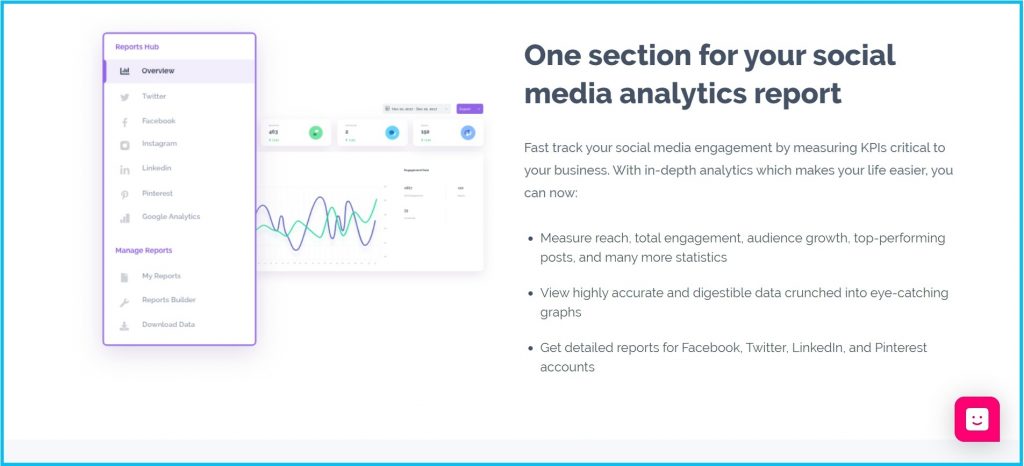
Once you spot the blog posts on your blog with most social media shares, analyze their topics, keywords, and titles to elicit the secret sauce for the new blog posts.
Most Commented Blog Posts
One of the signals of the popular content is the highest number of comments. Look out for the blog posts that you have published on the blog and they have got loads of comments. Readers leave good comments on the blog posts for various reasons:
- They could be genuinely interested in the topic
- They might have liked the piece you’ve written
- They agree with your point-of-view on the subject
- They learned something from your content
So if your content made a difference in their life or work, they’re going to leave a comment and say something positive to you.
Don’t hesitate to dig deeper and find out the blog posts with a maximum number of comments.
Page Views on the Blog Posts
The total pages views on the blog posts tell you how readers and subscribers responded to your content. The higher the number of page views, the greater the popularity of your content. In case, you aren’t using any page views plugin on your WordPress site, then consider trying the “page views counter” plugin.
However, you can go through your preferred website analytics tool such as Google Analytics or StatCounter to watch out for the page views on the blog posts.
The above-mentioned methods help you identify the popular content on your blog. Finding those blog posts that have done well is half the equation. The next part is the purpose of finding those popular posts, which is to idealize the demand of the audience and create relevant content to your popular content.
Once you start putting out relevant content, chances are, you’d start to dominate the specific segment of your niche, which will ultimately drive more traffic to your website.
Uncover Your Competitors’ Keywords
Competitors are a reality and you don’t have to be scared of it. The number of competitors may increase over time, but at the same time, you must be aware of finding new opportunities to dominate. Therefore, we can say that awareness is something that could put you on a pedestal.
Now, it’s vital to understand that uncovering the competitors’ keywords is strictly for the analysis purpose.
You may not want to target keywords that a dozen competitors are already targeting for years.
Instead, you’ll be better off if you know what not to pursue beforehand.
Finding out your competitors’ keywords doesn’t necessarily mean you have to try to rank for those keywords. Instead, you can learn different perspectives of players in the same industry. Not only you can learn from their targeting strategy, but you could also discover relevant opportunities.
The whole idea of “discovering the right topics” fall apart if you ignore the competition. The reason is that you may end up picking a fight that you might not win.
There are popular keywords research tools for finding the right keywords for your website or blog. Not only do they tell you about your top-performing keywords, but they also fill you in about the competitors’ keywords.
Here are three of the most popular keyword tools to spy on your competition:
- SEMrush
- SpyFu
- Ahrefs
Once you have some idea what keywords your competitors are targeting, you can navigate towards different ones or look out for the relevant keywords.
There is a misconception regarding keywords is that one should target a keyword that has thousands of searches every month. A lot of starters completely ignore the competition level and pursue keywords with thousands of monthly searches, which isn’t the wisest thing to do.
Discover New Targeted Audiences
Since we have established that the right topics would lead to more website traffic so we need to grasp another idea to get even more effective results. We must look at the new targeted audiences. It won’t be something that will happen on a whim, but instead, it would require brainstorming, research, and planning.
When we set our eyes on specific keywords, we push hard on creating content around those keywords. The next thing we know, we go through our statistics and find out that we’re ranking on the second page for specific keywords. Then, we push even harder by pumping out content, reaching out to blogs for guest posts, and trying to build more links to get on the first page.
This is where we miss out on a small opportunity of targeting the newer audience that is not very far away, and we may not have to struggle much to get them. The monthly searches, however, could be far less than your targeted keywords, but still, you can get something out of it.
I don’t say that don’t push hard on your main keywords, but I’m saying that eyeing those relevant but new audience might increase your website traffic within a short period.
To discover that new targeted audience, you can adopt three strategies:
-
Find Relevant Keywords
This methodology doesn’t require any professional-level SEO expertise to pull this off. Finding relevant keywords means going through the list of keywords and take a couple of keywords that you previously neglected.
Chances are, you’ve already found your main keywords to target, then all you need is to take a look at the relevant keywords from the very same list and select a couple of new ones.
For instance, go to your keyword research tool and type in your search term to find the keywords to target. What you’d see in any keyword search tool is that it would show you a list of relevant keywords:
All you need to do is try out a new yet relevant keyword in your content to test out the results.
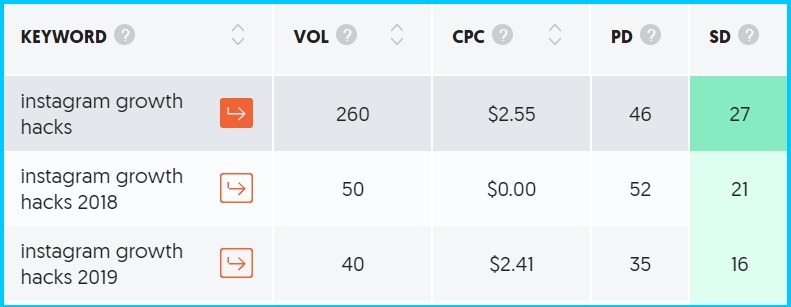
The above-mentioned screenshot is taken from UberSuggest.
-
Analyze Related Searches
Discovering a new audience may seem scary for beginners, but the strategies I’m sharing with you should make it easier for everyone. Have you ever seen the “related searches” in Google? Whenever you type in your search term and hit enter, you see the search results on the page, and there are related searches mentioned at the bottom.

One of the ways of finding a new yet relevant audience is to look out for the related searches in Google. Not only do those related searches help you find relevant search terms to target, but they also inform you what people need to know.
So by targeting those related searches in your content, you could tap on the new audience segments that aren’t too far away.
-
Use Similar Hashtags
What this strategy means is that you can utilize the power of additional hashtags along with your generic industry-related hashtags. You might have seen people use two or more hashtags in their tweets.
What you should do is that watch out for tweets from your industry experts and note down the hashtags that aren’t mainstream, but people are using them. Our goal is to discover a new audience so finding and using similar hashtags could do wonders for us.
For instance, I put this strategy to test on Twitter. I searched for #writingtips on Twitter and found out that people are using #AmWriting along with #writingtips.
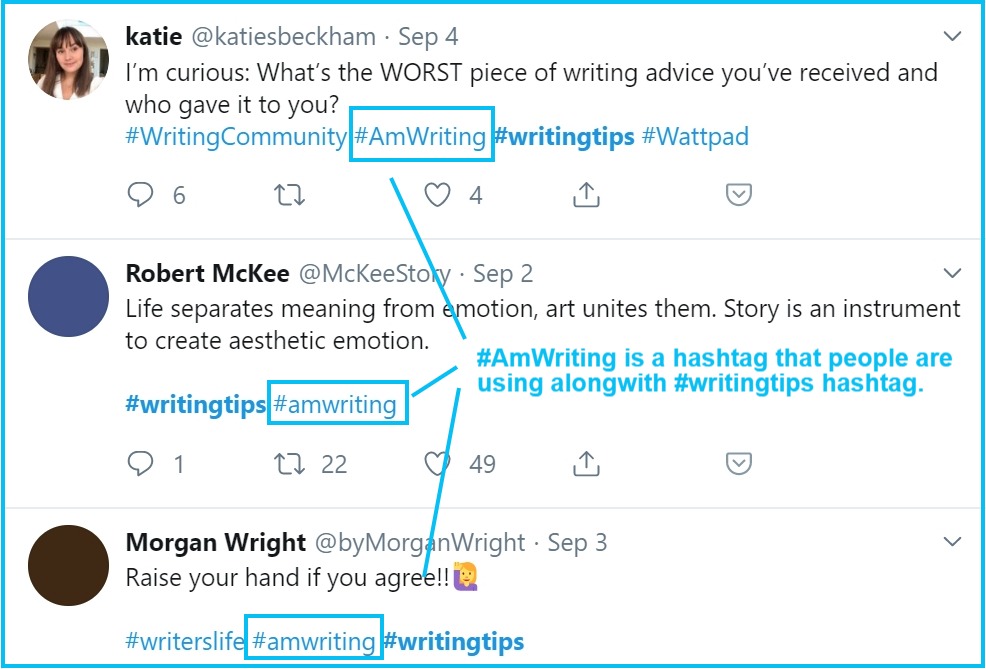
Turns out, my strategy was already being applied which gives it a big fat validation. It means that you can always look out for the related hashtags that others are using along with the common ones and use those as well.
This way, you could put forth your content to more audiences, and as a result, you could drive more traffic to your website.
Final Thoughts
You might be producing loads of content every week and putting out great pieces on the blog and social media.
The essence of this blog post is to eye the most appropriate topics to talk about and attract the audience that would care about your point of views.
However, the caveat is to find the audiences and reach out to them, which could be resolved if we opt for the right topics to create content.
To conclude this, I’d say that the four tactics I shared were intended to preach to you the importance of your audience awareness. The more you understand your followers, the better you cater for them through your content. Plus, you’d drive more traffic to your website.
Therefore, discovering the “right topics” to talk about on social media as well as the blog would allow you to get closer to the most relevant audience you need.
What else would you add to the discussion on discovering the right topics in content creation?































